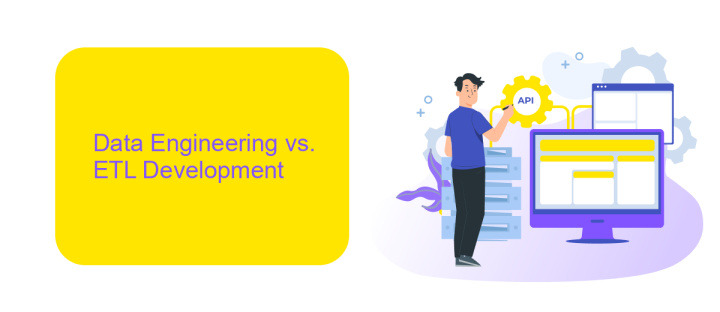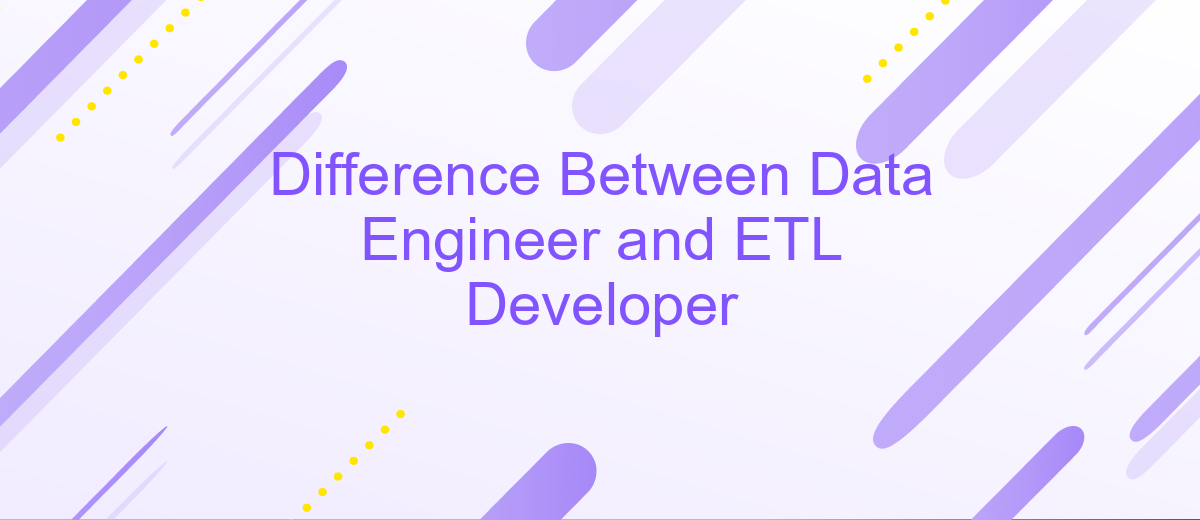Difference Between Data Engineer and ETL Developer
In the rapidly evolving field of data management, understanding the distinct roles of data engineers and ETL developers is crucial. While both positions are integral to handling and processing data, they have unique responsibilities and skill sets. This article delves into the key differences between data engineers and ETL developers, helping you grasp their specific functions and contributions to data-driven projects.
Introduction
In the ever-evolving landscape of data management and analysis, understanding the roles of Data Engineers and ETL Developers is crucial. Both positions are integral to the effective handling of data but serve distinct functions within an organization. This article aims to clarify the differences between these two roles, shedding light on their unique responsibilities and how they contribute to the broader data ecosystem.
- Data Engineers: Focus on building and maintaining the infrastructure for data generation, storage, and processing.
- ETL Developers: Specialize in the Extract, Transform, Load processes, ensuring data is accessible and usable for analysis.
While Data Engineers lay the groundwork for data architecture, ETL Developers streamline the data flow from various sources to analytics platforms. Services like ApiX-Drive can further enhance these processes by automating data integration, making it easier for both roles to collaborate efficiently. Understanding these distinctions helps in leveraging the right skill sets for your organization's data strategy.
Data Engineering vs. ETL Development

Data Engineering and ETL Development are closely related but distinct roles within the data ecosystem. Data Engineers focus on building and maintaining the infrastructure that allows for the collection, storage, and analysis of data. They design and implement data pipelines, ensuring that data flows smoothly from source to destination. This involves working with large-scale distributed systems, databases, and various data storage solutions to ensure data is accessible and reliable.
On the other hand, ETL (Extract, Transform, Load) Developers specialize in the process of extracting data from different sources, transforming it into a usable format, and loading it into a data warehouse or other storage systems. While Data Engineers may also perform ETL tasks, ETL Developers are more focused on the data transformation and integration aspects. Tools like ApiX-Drive can be particularly useful for ETL Developers, as they streamline the integration process by connecting various data sources and automating data workflows, making the data preparation process more efficient.
Responsibilities

Data Engineers and ETL Developers have distinct but complementary roles in managing and processing data within an organization. Data Engineers are primarily responsible for designing, constructing, and maintaining scalable data pipelines and architectures, ensuring robust data integration and storage solutions. On the other hand, ETL Developers focus on the extraction, transformation, and loading of data from various sources into a centralized data warehouse or data lake.
- Data Engineers design and implement data pipelines to transport data from various sources to storage solutions.
- They ensure data quality and integrity through validation and monitoring processes.
- ETL Developers create and manage ETL workflows to extract, transform, and load data efficiently.
- They often work with tools like ApiX-Drive to automate data integration tasks and simplify data workflows.
- Both roles collaborate to optimize data storage, retrieval, and processing for better decision-making.
While Data Engineers focus on the broader architecture and infrastructure, ETL Developers specialize in the data transformation processes. Both roles are crucial for maintaining a seamless flow of accurate and timely data across the organization, enabling data-driven insights and strategies.
Skills and Qualifications

Data Engineers and ETL Developers both play crucial roles in managing and transforming data, but their skills and qualifications can differ significantly. Data Engineers are primarily focused on designing, building, and maintaining the infrastructure that allows for the collection, storage, and analysis of data. They need to be proficient in programming languages such as Python, Java, or Scala, and have a strong understanding of database systems and cloud platforms.
ETL Developers, on the other hand, specialize in the Extract, Transform, Load process. They are responsible for extracting data from various sources, transforming it into a usable format, and loading it into target systems. Their expertise often includes proficiency in ETL tools like Apache Nifi, Talend, or Informatica, and a deep understanding of data warehousing concepts.
- Proficiency in programming languages (Python, Java, Scala)
- Experience with database systems (SQL, NoSQL)
- Familiarity with cloud platforms (AWS, Azure, Google Cloud)
- Expertise in ETL tools (Apache Nifi, Talend, Informatica)
- Understanding of data warehousing and data modeling
- Experience with integration services like ApiX-Drive for seamless data integration
Both roles require strong problem-solving skills and the ability to work with large datasets. While Data Engineers focus more on the infrastructure and scalability of data systems, ETL Developers are more concerned with the data transformation processes. Mastery of these skills and tools ensures that data flows smoothly and efficiently throughout an organization.
Conclusion
In conclusion, while both Data Engineers and ETL Developers play crucial roles in the data ecosystem, their responsibilities and skill sets differ significantly. Data Engineers are primarily focused on the architecture, design, and maintenance of data pipelines, ensuring data integrity and scalability. On the other hand, ETL Developers specialize in the extraction, transformation, and loading of data, making sure that data is accurately and efficiently moved between systems.
Understanding these distinctions is essential for organizations looking to build robust data teams. Tools like ApiX-Drive can further streamline the integration process, making it easier for both Data Engineers and ETL Developers to collaborate and achieve seamless data workflows. By leveraging the strengths of each role and utilizing advanced integration services, companies can ensure they are making the most of their data assets.
FAQ
What is the primary role of a Data Engineer?
What does an ETL Developer do?
Are the skills required for a Data Engineer and an ETL Developer the same?
Can one person perform both roles?
How can automation tools assist in the work of Data Engineers and ETL Developers?
Strive to take your business to the next level, achieve your goals faster and more efficiently? Apix-Drive is your reliable assistant for these tasks. An online service and application connector will help you automate key business processes and get rid of the routine. You and your employees will free up time for important core tasks. Try Apix-Drive features for free to see the effectiveness of the online connector for yourself.

